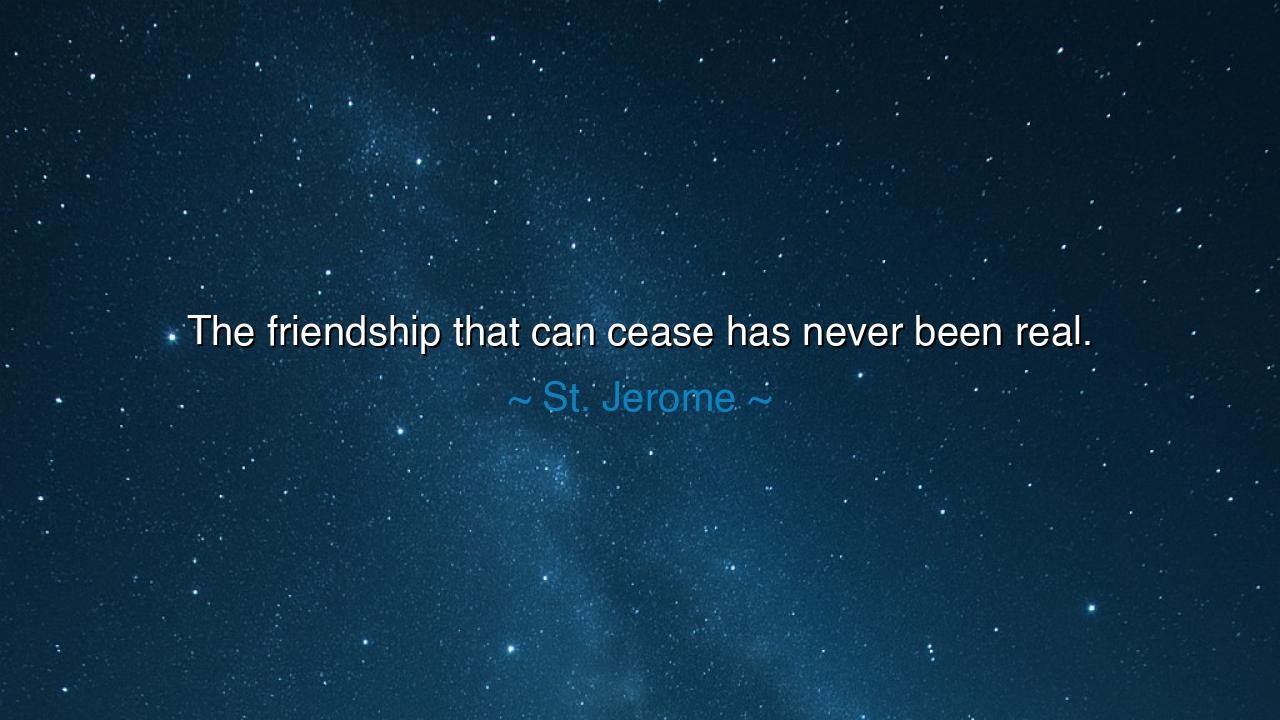
The friendship that can cease has never been real.






“The friendship that can cease has never been real.” Thus spoke St. Jerome, the fiery scholar and translator of the Scriptures, a man whose spirit burned with both divine passion and human insight. In this brief but eternal phrase, he unveils a truth that pierces the heart like a sword: that true friendship is not a passing comfort, but a sacred bond that time, distance, and trial cannot destroy. It is love rooted not in convenience, pleasure, or gain, but in truth and virtue—and whatever is rooted in these endures forever. For that which can die was never truly alive, and the affection that can be undone was never love, but imitation.
The origin of this saying lies deep within Jerome’s own life. A man of fierce conviction, he knew both the sweetness and the pain of friendship. His relationships with others—among them the noble Paula, his devoted follower, and Rufinus, his one-time friend turned adversary—revealed to him the fragile nature of human attachment. He saw how pride, misunderstanding, and ambition can unravel what was thought to be eternal. Through his trials, Jerome came to this great realization: that real friendship, like faith itself, is proven not in fair weather but in the storm. The bond that vanishes in hardship was never pure; the love that withers in conflict was never true.
In this, Jerome speaks not only as a theologian but as a sage of the human heart. He reminds us that friendship is not a mere feeling, but a covenant of souls—a meeting of spirits bound by truth, sustained by loyalty, and sanctified by love. The friendship that endures beyond anger, disappointment, or loss is the one that was forged in sincerity. To say that friendship “can cease” is to admit that it was built upon sand, not stone; it was an echo of self-interest rather than the voice of devotion. For true friendship is eternal, because it springs from what is eternal—the goodness within us, the divine spark that seeks the good of another without expectation of return.
We see this truth reflected in history’s greatest friendships. Consider David and Jonathan, the princes of ancient Israel. Though one was destined to inherit the throne and the other destined to lose it, their hearts were knit as one. Jonathan risked his father’s wrath and his own future to protect David, and when Jonathan fell in battle, David mourned him with words that have outlived kingdoms: “Thy love to me was wonderful.” That bond did not die with death; it lived in memory, in loyalty, in song. It was a friendship that could not cease, for it was founded in love untainted by envy or fear.
Yet, St. Jerome’s teaching is not sentimental. It is not a soft comfort, but a test of character. To claim to be a true friend, one must ask: “Will I love even when wronged? Will I remain steadfast when all grows dark?” For true friendship demands courage—the courage to forgive, to remain when others flee, to believe in the goodness of another even when the world condemns them. It demands the humility to recognize one’s own faults and the grace to endure another’s. The friendships that vanish under strain were never real, because they were never selfless. They were mirrors of convenience, not windows into the soul.
And yet, Jerome does not condemn those who lose friends; he invites them to reflection. When a friendship ends, one must not merely grieve its loss, but seek to understand its nature. Was it built on virtue or vanity? On love or desire? For when friendship is founded on fleeting things—on beauty, wealth, or pleasure—it perishes with them. But when it is born of mutual reverence, truth, and the longing to see one another grow in goodness, then it is immortal, untouched even by death itself.
Let this be the lesson, then, for all who would walk the noble path of friendship: choose wisely, love deeply, forgive often, and hold fast to the truth. Do not measure friendship by ease or flattery, but by its endurance through trial. Be the friend who stays when others go, who believes when others doubt, who loves when others judge. For such friendship is a reflection of the divine—it does not begin or end in time, but belongs to eternity.
Thus, remember always the words of St. Jerome: “The friendship that can cease has never been real.” Let them be both warning and inspiration. For in a world where many ties are shallow and many hearts are fleeting, strive to cultivate the rare and sacred bond that endures. Such friendship, once found, is a treasure beyond gold, a fortress against despair, and a glimpse of heaven itself.






AAdministratorAdministrator
Welcome, honored guests. Please leave a comment, we will respond soon